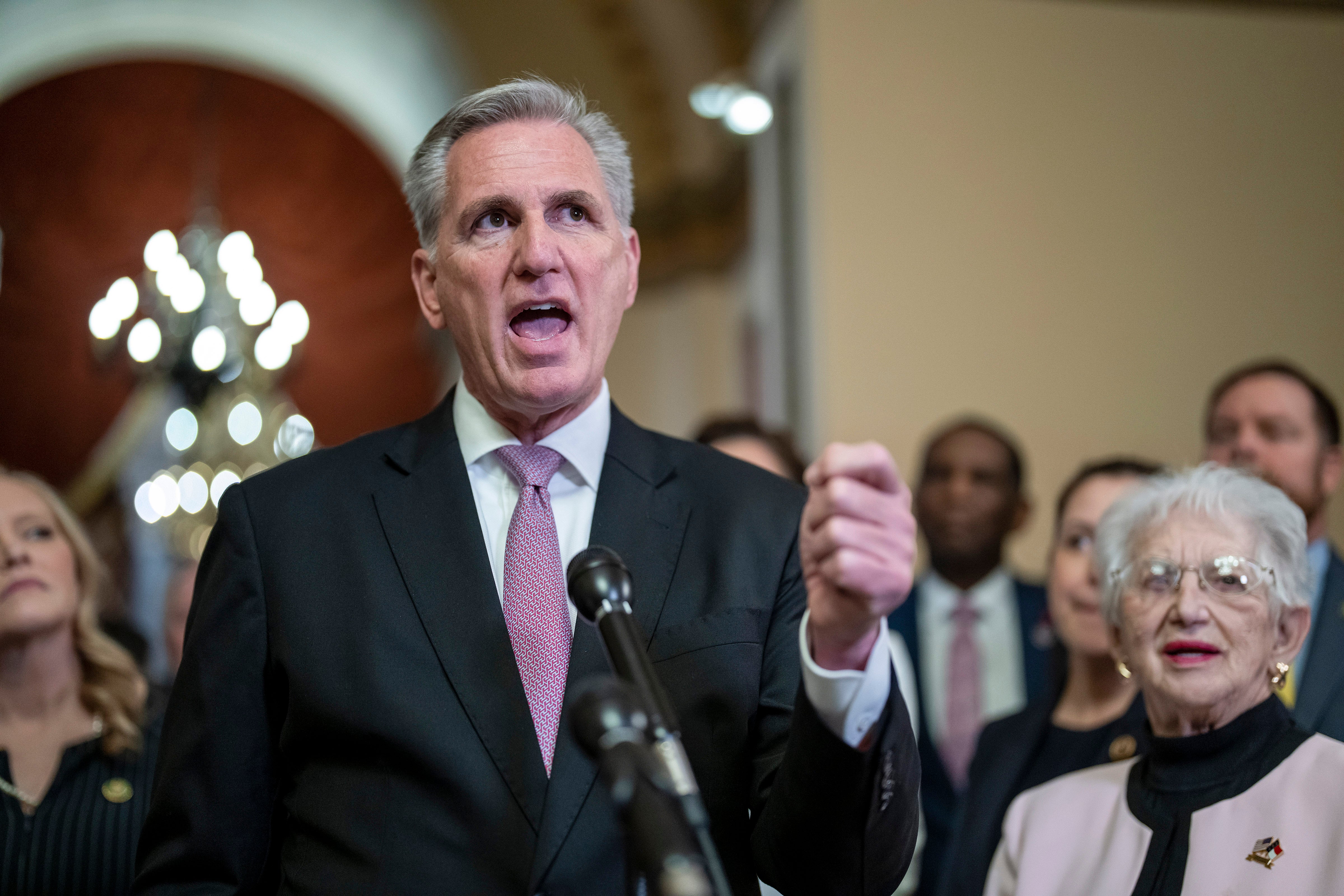McCarthy calls on Biden to schedule meeting on debt ceiling
Republican House Speaker Kevin McCarthy says he’s growing increasingly concerned about President Joe Biden’s unwillingness to negotiate on lifting the nation’s borrowing authority

Your support helps us to tell the story
From reproductive rights to climate change to Big Tech, The Independent is on the ground when the story is developing. Whether it's investigating the financials of Elon Musk's pro-Trump PAC or producing our latest documentary, 'The A Word', which shines a light on the American women fighting for reproductive rights, we know how important it is to parse out the facts from the messaging.
At such a critical moment in US history, we need reporters on the ground. Your donation allows us to keep sending journalists to speak to both sides of the story.
The Independent is trusted by Americans across the entire political spectrum. And unlike many other quality news outlets, we choose not to lock Americans out of our reporting and analysis with paywalls. We believe quality journalism should be available to everyone, paid for by those who can afford it.
Your support makes all the difference.House Speaker Kevin McCarthy, R-Calif., said Tuesday he's growing increasingly concerned about President Joe Biden's unwillingness to negotiate on lifting the nation's borrowing authority, saying in a letter to the president that the White House position “could prevent America from meeting its obligations and hold dire ramifications for the entire nation.”
Rather than open direct talks on the debt ceiling, which the Democrats agree must be raised, Biden and his party's lawmakers are challenging Republicans to publicly present their own budget proposals — something McCarthy has declined to do.
For now, the Treasury Department has resorted to “extraordinary measures” to avoid default on the nation’s $31.4 trillion borrowing authority. But those measures will run out — and put the U.S. at risk of being unable to pay all of its bills — possibly as early as June.
The White House has emphasized that Biden is not willing to entertain proposed cuts in programs in exchange for lifting the debt limit — without solid information about what spending cuts the Republicans want. But McCarthy and Republicans are insisting that he must for debt ceiling legislation to move ahead.
“Nearly two month ago, you and I sat down to discuss a path forward on the debt limit,” McCarthy wrote in a letter dated Tuesday. “Since that time, however, you and your team have been completely missing in action on any meaningul follow-up to this rapidly approaching deadline.”
He also told Biden, “Simply put: you are on the clock. It's time to drop the partisanship, roll up our sleeves, and find common ground on this urgent challenge. Please have your team reach out to mine by the end of this week to set a date for our next meeting.”
Show your plans first, the White House says, believing that many voters would not look favorably on the proposed cuts.
So far, only the House Freedom Caucus, which includes many of the House's most conservative members, has put forward a blueprint, which includes returning to fiscal year 2022 spending levels and allowing for 1% annual growth after that for the next 10 years. The plan also includes rolling back an estimated $400 billion in Biden’s student loan relief and clawing back all unspent COVID-19 funds.
The White House has seized on those Freedom Caucus proposals, saying they would lead to draconian cuts that would endanger Americans' safety. such as cutting federal support for local law enforcement, scaling back rail safety inspections and jeopardizing safety at U.S. airports while increasing wait times at TSA security check points.
Republicans say voters gave them a mandate to reduce future deficits and put the country on firmer financial footing for coming decades. They are portraying the White House as inviting the standoff and hoping to shift the blame for any damage to the economy that may result. Rep. Scott Perry, R-Pa., chairman of the Freedom Caucus, said Monday evening he believes Biden is “stalling here and wasting time and running down the clock.”
“If we get into a problem here, a crisis, I think Speaker McCarthy has been ready to go the whole time,” Perry said.
But Democrats believe the pressure will continue to build on Republicans to allow for a clean debt ceiling increase — with no spending-cut trade-offs — and then lawmakers from the two parties can negotiate overall levels for federal agencies in spending bills for the coming fiscal year. The failures of Silicon Valley Bank in California and Signature Bank in New York have also added to concerns about the U.S. economy.
"It’s time for Republicans to stop playing games, agree to a pass a clean debt ceiling bill, and quit threatening to wreak havoc on our economy," the White House said before McCarthy's letter was sent.
McCarthy did list several prospects for federal spending in his letter to Biden. Among them:
— Reducing “excessive non-defense” spending to “pre-inflationary levels” and limiting growth in future years.
— Reclaiming unspent COVID funds that he says have sat dormant for more than two years.
— Strengthening work requirements for people without dependants who receive federal assistance.
— Enacting policies to lower energy costs and secure the U.S.-Mexico border.
McCarthy spoke about his letter to the president during Tuesday morning’s closed door meeting of House Republicans, according to a person familiar the private session and granted anonymity to discuss it. McCarthy told his colleagues that Biden misled them about the budget negotiations which have essentially stalled since their first meeting Feb. 1, the person said.
Rep., Steve Scalise, the Republican House majority leader, said afterward that McCarthy has laid out his ideas. “We’re not just going to give the president another credit card to go max out,” Scalise said.
____
AP Congressional Correspondent Lisa Mascaro contributed to this report.